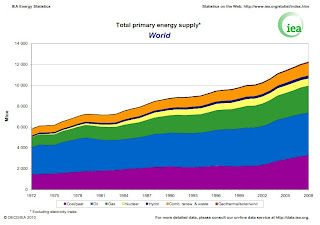The risks caused by nuclear power plants in Japan given the recent earthquake are giving new strength to anti-nuclear power activists. While it's true that nuclear power has some of the biggest potential risks in energy generation, the energy problem can't be simplified to just such arguments.
Energy is critical to one country life and Japan "must import over 80% of all primary energy needs" (1). Given its small amount of natural resources, it's almost certain that Japan would have never be such a strong economy without nuclear power. Actually, "nuclear power accounts for approximately one-third of the country's total electric power output" (1), which is a key factor for both quality of life and economic development in the country. So the question is not whether nuclear power is to risky or not; the question is if the risk is worth the benefits, in this case being the 3th economy in the world despite having very few natural resources.
The difference in these questions is that the risk is put in context. On one hand it shows what might be lost if we don't take the risk of nuclear power; on the other hand it allows to evaluate different energy source options in the same way. So along the nuclear power question we can ask, if the current oil dependence is a risk we are all wishing to take or should we move away from that technology too?
With this in mind, the arguments are no longer whether we know how to handle radiactive waste or if nuclear power plants are safe enough. The point is which options do we have? If Japan would have accepted not to be the 3th strongest economy in the world, or if he had found a way to do it without nuclear power, then he could avoided having 55 reactors operating as he does. But then again, how many "oil wars" and greenhouse gas emissions could have been saved if developed countries (specially United States as we can see in the graphs ahead) would given up their quality of life to reduce their oil comsuption.
click on the graph to make it bigger
Via the Guardian (2)
Furthermore, 87% of our energy sources have a clear limit (3). As the FEPC mentions "recoverable energy reserves of oil are forecast to last only another 40 years, natural gas for 61 years, coal - by far the most abundant energy resource - for 227 years, and uranium for 64 years" (1). Decreasing energy use can extend these periods, but still, resources are limited so eventually we are going to run out of them.
click on the graph to make it bigger
With this panorama, it's clear that whether we want to decide for or against nuclear power, or if we want to think in a sustainable energy strategy for the long run; considering our options for reducing energy consumption and diversifying our energy sources is crucial to be able to decide which risks we are willing to take.
1. Web site of The Federation of Electric Power Companies of Japan (FEPC), specific web pages consulted are: http://www.japannuclear.com/nuclearpower/program/ and http://www.japannuclear.com/nuclearpower/program/why.html
2. More info about this graph and its data source at BP energy statistics: the world in oil consumption, reserves and energy production
3. Share of total primary energy supply in 2008, IEA. (http://www.iea.org/stats/pdf_graphs/29TPESPI.pdf)

No comments:
Post a Comment